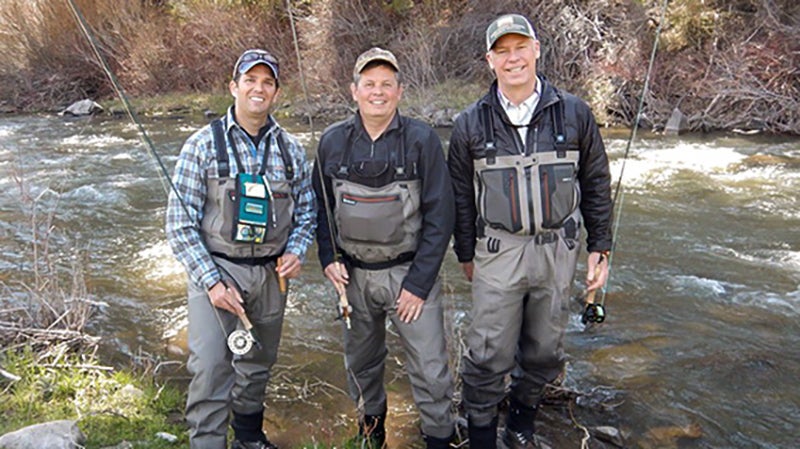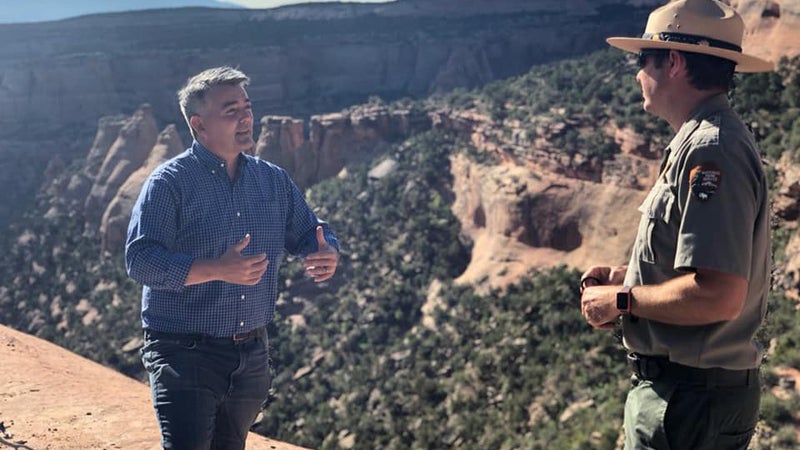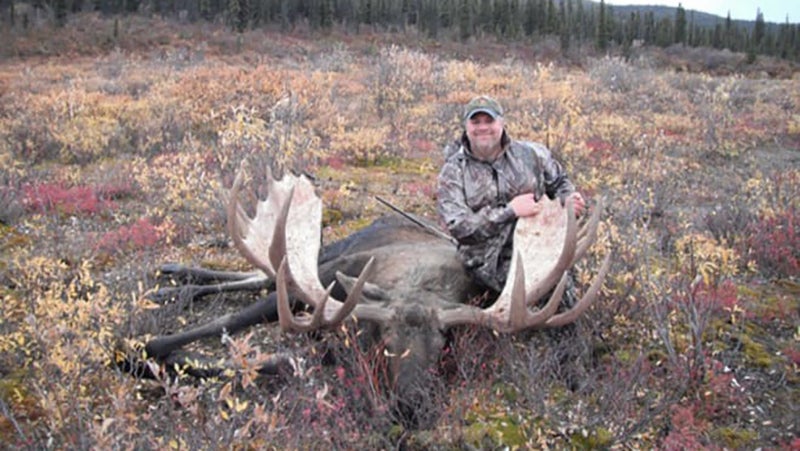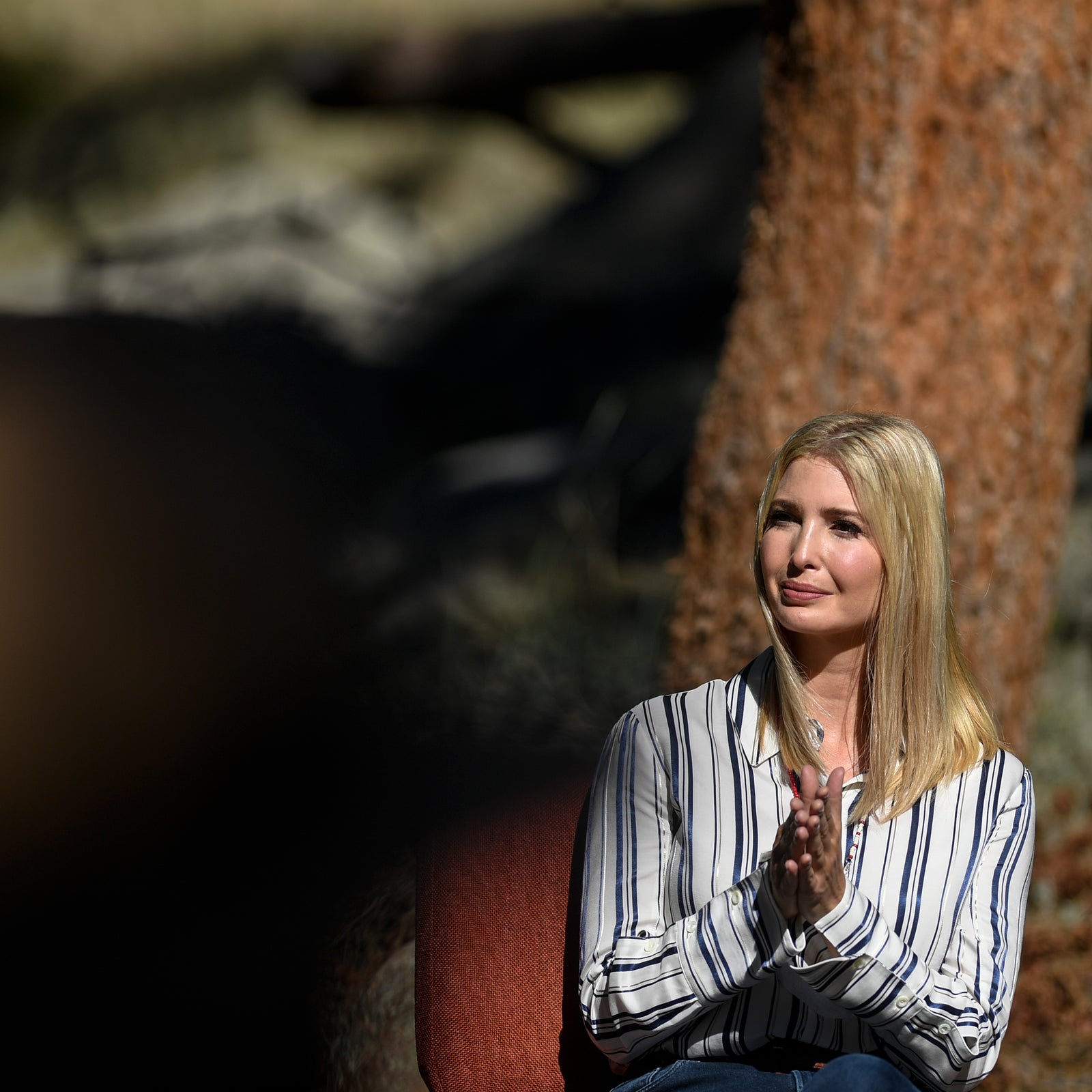It’s election season. And��as sure as the annual journey of waterfowl��out of Alaska and Canada and down into��the southern United States and Mexico, that means another migration has started to take place: that of Republican politicians into the outdoors. It’s a performance that��at the best of times����but, after three and a half years of the Trump administration,��now feels downright��hypocritical.��
But What About the Great American Outdoors Act?��
A bunch of politicians from both sides of the aisle are taking victory laps after the Great American Outdoors Act��(GAOA) was ��on August 4. It says it will “fully fund” the Land and Water Conservation Fund (LWCF) for the first time since it was created in 1964��and set��aside a $9.5 billion pot of money to be spent on the maintenance backlog on our public lands over five years.��
Make no mistake, the GAOA is a good thing. Maybe even a very good thing. But it’s not the overwhelming achievement Republican politicians would lead you to believe.��
For one thing, I take issue with the idea that GAOA “fully funds” the LWCF’s $900 million annual budget. That funding amount , so let’s run some quick math on the inflation:��$900 million in 1978 would be over $3.5 billion today. A more accurate description would be to say that the GAOA will allow the LWCF to achieve 25 percent of its intended impact. The�� to adjust that $900 million for inflation in the future either, so it will “fully fund” less and less of the LWCF’s objectives��with every passing year.��
The purpose of the LWCF is to ��across our nation’s incredible and��unique system of public lands. And it’s a particularly neat piece of legislation, because it draws its budget not from taxpayers��but from offshore oil and gas leasing fees, partially offsetting the environmentally deleterious impacts of those industries,��using their own money. It’s the kind of thing that should foster bipartisan support,��but rather than treat LWCF funding as the no-brainer it should be, it’s instead been used as a political football for nearly the entirety of its 56-year history. Its funding was even allowed to lapse entirely in 2018, after Republicans in the Senate on an appropriate amount.��
And failing to fund the LWCF—and pay for other public-lands projects—over the past 56 years has led to major problems. Today��the backlog of maintenance across all public lands, including national parks, stands in excess of $20 billion. One of the GAOA’s achievements is devoting $1.9 billion in annual funding��for the next five years��to address��that backlog. The trouble, however, is��not only does��$9.5 billion not equal $20 billion, it’s��that the backlog will continue to grow during that time (the National Park Service’s backlog alone grows at the rate of at least $275 million per year), and that this spending represents only a small fraction of the oil and gas revenues generated on public lands.��
The Department of the Interior oversees��national parks, Bureau of Land Management land, agricultural water supplies, national wildlife refuges, and offshore energy production. (The Department of Agriculture manages national forests.) All of the drilling, mining, and other industrial uses of those lands and waters contribute�� to the American economy each year. According to its mission statement, the DOI is supposed to manage those lands and waters under , balancing extraction��with public recreation and ecosystem conservation. So��while $1.9 billion a year may sound like a lot of money to you and me, it’s merely��0.5 percent of the total��money generated on DOI lands and waters alone. If you factor in , that percentage will fall even further. Extractive industries continue to be prioritized by Republican politicians to a degree that vastly outweighs what few crumbs might fall toward��public access.��
So��why are Republicans being so vocal in the celebration of the act’s passage? Because the entire thing is an exercise in election-year disinformation, obviously. These are the worst perpetrators of performative outdoorsiness.��

Steve Daines
“Consider this a gift from McConnell to Daines, as well as Colorado senator��Cory Gardner, who are both up for reelection this year,” ��on the passage of the GAOA. “Both senators, who are considered vulnerable and crucial to McConnell’s plans of keeping control of the Senate, plan to campaign off passing the legislation.”
The 116th Congress ��to the Senate during its current session, the vast majority of which Senate majority leader Mitch McConnell has simply chosen to block. Neither McConnell nor President Trump have demonstrated much interest in other pro-environment, pro-public-lands policy. So why did McConnell allow the GAOA to come to a vote, and why did Trump sign it into law? All signs point to it being a ploy to aid vulnerable GOP senators during a difficult election year for them.��
And Daines, a Republican senator for Montana, is already campaigning on the GAOA’s success, ��“one of the most important conservation bills not in years, but in decades.”
The thing is, while Daines has championed the GAOA, his other votes and actions have combined to undermine the LWCF’s goals and work against public access on public lands, threaten ecosystem conservation��in Montana and��across the country, and may��worsen the effects of climate change.��
Notably, to run the BLM. That agency oversees one-tenth of our nation’s landmass, yet Pendley—who has written several openly racist��and��homophobic op-eds—has been working toward��the sale of those lands since at least the early 1980s.��
And Pendley isn’t the only unsavory character Daines supports.��
“I know Scott Pruitt will use sound science in his decisions as EPA administrator,” when ��to that position in 2017. Pruitt was forced to resign less than a year later��amid a dozen ethics investigations into a variety of scandals .��
Daines as DOI solicitor general, even though Jorjani was the subject of an ongoing ethics investigation by the��DOI solicitor general’s office and has been��.��
Daines has also voted for oil drilling in the Arctic National Wildlife Refuge; to block public input in BLM decision-making; in favor of gutting the Antiquities Act; to��sell��off public lands, including wildlife refuges, wilderness areas, national forests, national monuments, and national memorials; and in 2015, he��. , meaning he’s voted against conservation initiatives 94 percent of the time.��
How does Daines prefer to do his performative outdoorsiness? Two years ago, his staff pitched me to write a profile of Daines, suggesting��I focus my��questions around a recent backpacking trip he’d taken through a wilderness area here in Montana, where I live—a��wilderness area to sell off such lands. I insisted on asking questions about that, at which point they stopped returning my calls.

Cory Gardner
Colorado senator Cory Gardner, a Republican, who is also facing a difficult reelection bid this fall, ��“the single greatest conservation achievement in generations.”
Yet he hasn’t always supported LWCF funding. In 2011, . Actions like this��are part of the reason we currently have such a large maintenance backlog on public lands.��
The League of Conservation Voters . He’s voted against science, public access, and clean water��and .��
Gardner’s act of performative outdoorsiness:��in 2019, he helped launch the , a group of Republican politicians allegedly enthusiastic about conservation issues. Later that same year, , one of President Roosevelt’s favorite places.��
Donald Trump Jr.��
Donald Trump Jr. acts as a political surrogate for his father, often promoting the types of and even this president can’t touch. He’s worked hard to cultivate an outdoorsy image, paying other people to scout animals, then transport him to their location so he can shoot them, then take pictures with their dead bodies.��
Junior is��in the news right now for tweeting opposition to the Pebble Mine, a mineral-deposit development project that, if approved by the Trump administration, could become the largest mine in North America. The environmental impacts of such a big project are far-reaching, especially in a place as fragile as Alaska. It threatens the state’s largest salmon fishery, as well as all the animals further up the food chain who depend on those fish to survive.��
Why take a stand against this project, when his father’s administration is responsible for so many attacks on clean water and public lands, has attempted to in decision-making, and pushed����that will likely be remembered by many as the era��we gave up the ability to meaningfully address climate change? It’s the definition of performative outdoorsiness.��
Already��dozens of articles have been written on the issue. If his dad does decide against issuing the mine a permit, Junior will��inevitably be given a large part of the credit for the decision, despite years of hard work and millions of dollars spent by various activist groups working to oppose the project. And that credit will come despite failing to speak up against , and all for the effort it took to send a single tweet.��
It’s the public-image equivalent of someone who’s never climbed a mountain suddenly posing for a photo in mountaineering boots.��

David Bernhardt
Both and voted to confirm oil and gas lobbyist David Bernhardt for interior secretary after his old boss, Ryan Zinke, was forced to resign due to a long list of ethics investigations. Four days later, the DOI opened its first investigation into Bernhardt.��
Bernhardt is particularly relevant to this list of performatively outdoorsy Republican politicians for several reasons. The first is that he’s probably been personally responsible for more environmental degradation during his less than two years in office than any other member of the Trump administration. He’s successfully worked to deny polar bears Endangered Species Act protections, open��up ANWR to drilling, fast-track��countless drilling projects across public lands, and even roll��back protections put in place for offshore oil workers (and the environment) in the wake of the Deepwater Horizon tragedy. He’s done all that of his former lobbying clients.��
Bernhardt is also personally responsible for a large chunk of that maintenance backlog on public lands. You’ve probably seen an $11.6 billion number thrown around as the backlog in the��national parks alone, but the thing is, . The DOI has provided no updates on it since Bernhardt took office, first as deputy secretary, then secretary of the interior. We already know the backlog��number was increasing at a rate of $275 million a year before that time, and since then, there have been two incredibly costly disasters for the park service: first, the that began in 2018 and ran into 2019, then . Berhardt ordered parks to remain open through both crises. Examples of costly damage to the parks exist for��both of these��incidents, yet Bernhardt hasn’t released��the updated information.
We don’t actually know the degree to which the GAOA will help with the maintenance backlog on our public lands, because a Republican politician who was appointed by Trump—and confirmed by senators, including Daines and Gardner—is blocking the disclosure of those numbers. Those same politicians are bragging about the impacts of their achievements��but are being denied the ability to actually calculate them by one of their own.��
I know Congress doesn’t have updated numbers on the maintenance backlog because, prior to the pandemic, I was working with a congressman’s office to try and force their disclosure via the��, which is exactly what Daniel Jorjani when and voted to confirm him. Jorjani has continued to attempt to block��and slow��the release of FOIA materials since entering the role of inspector general—a��role in which he also has oversight over the 15 investigations initiated into Bernhardt’s potential ethical violations. While I was writing this piece, the DOI’s inspector general’s office (which Jorjani runs)�� accusing him of concealing documents ahead of Bernhardt’s confirmation hearing, in further violation of FOIA rules.��
Like Trump Jr., Bernhardt’s act of performative outdoorsiness is paying other people to find animals for him, then transport him to their location so that he can also shoot them, and then pose for pictures with their dead bodies.
That may sound like an unfairly negative description of high-dollar guided hunts, but as a passionate hunter, I’m using it for a��reason: to highlight the performative nature of the kinds of hunts Bernhardt and Trump Jr. participate in.�� is to cut taxes for the rich and for corporations, and the party gets there by manipulating voters using social issues and disinformation. The faux outdoorsiness performed by Republican politicians is part of that disinformation campaign. It’s intended to fool you into thinking that they’re just like you, or that they actually care about conservation. And that perception has consequences.��
One of the things Bernhardt is working on right now is a new rule that will permit extractive industries operating on public lands . Such a��rule puts the United States in violation of , threatening populations of migratory waterfowl like ducks and geese that currently move freely across our continent. A federal ruling��just , but it’s not currently clear what actions the DOI will take in response.
As I’ve explored at length, that act should be considered the crowning achievement for American hunters. Despite its common image as a blood sport (something perpetuated by performatively outdoorsy politicians), the reality of hunting is that it’s almost solely responsible for the restoration and continued health of wildlife populations in this country. And nowhere is that more evident than it is with birds. By the early 1930s, the population of migratory waterfowl on this continent had fallen as low as 27 million. Today��that number stands at 50 million. Heck, hunters pay to count them. But now��the treaty that facilitated that recovery is in jeopardy, and the politicians who are trying to convince you that they’re outdoorsy are the same ones putting it in jeopardy.��
Once November rolls around, all of these performatively outdoorsy Republicans will return to the security of their indoor spaces. But we can be sure they’ll emerge again every four years, ready to temporarily support conservation bills��and pose for photo ops. I just wish we could apply the same certainty to waterfowl migrations.��


